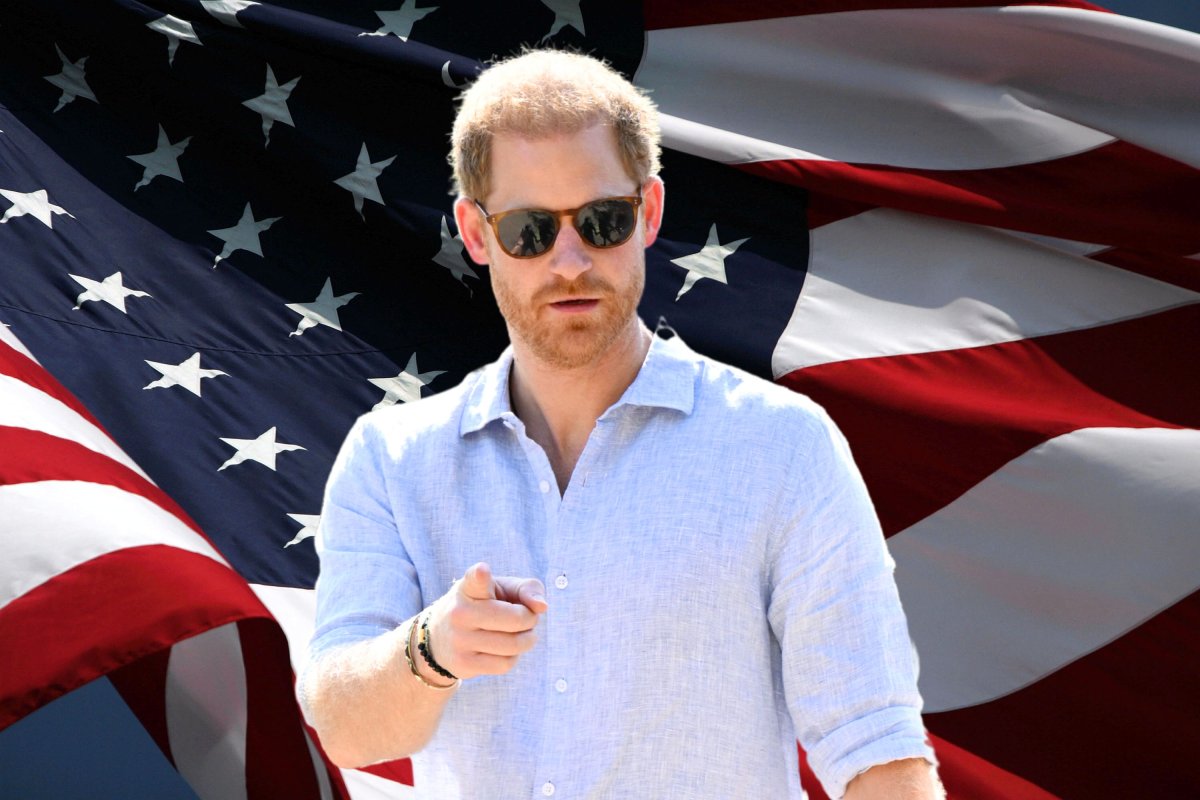Prince Harry would, in theory, have to give up his royal titles to become an American citizen—but could take a case to the Supreme Court to try to keep them, a leading family lawyer told Newsweek.
The Duke of Sussex told Good Morning America he had considered becoming an American citizen while promoting his Invictus Games tournament for wounded veterans in Canada.
However, his path could be a rocky one as the law currently states he would have to give up his royal titles and renounce his allegiance to any "foreign prince"—which may raise eyebrows at a time when King Charles III is undergoing treatment for cancer.
Alphonse Provinziano of U.S. law firm Provinziano & Associates says the law may, in fact, be flawed, paving the way for a Supreme Court challenge to keep his titles.
"If you want to become a U.S. citizen, there's a code section that says you have to renounce all of your foreign titles," Provinziano, a board member of the Los Angeles County Family Law Executive Committee, told Newsweek.
"I was interested in whether Prince Harry has to renounce all of his titles or not. It's a law stated by Congress, and all the constitution says is Congress can't confer foreign titles. But it doesn't say anything about being a foreign citizen [or] having a title when you become a U.S. citizen.
"I think there's actually a challenge to this under the equal protection clause of the 14th Amendment because it treats people differently. If you're a natural-born U.S. citizen, you can acquire a title from a foreign government."
Harry's daughter, Princess Lilibet, for example, was born in the United States but became a princess after her grandfather, Charles, became king.
That would mean gaining U.S. citizenship for Harry would create a bizarre situation in which Meghan Markle and Lilibet would have titles while he would simply be Harry Mountbatten-Windsor despite being born a prince.
Meghan never became a British citizen, despite suggestions she would ahead of her marriage, meaning she is American and yet still titled Duchess of Sussex.
"If you're becoming a U.S. citizen, you have to renounce your titles so it treats similarly situated people differently," Provinziano said. "That law, that was created by Congress, actually creates an unequal system.
"There is no Supreme Court case that interprets that code section merely because there's only been about a dozen American citizens who have had a prince or princess title.
"It's something that theoretically could go all the way to the Supreme Court because the court would have to review the law to make sure it's constitutional.
"The U.S. Supreme Court then, if it says Harry could keep his title or not keep his title, could have an effect on the line of succession of the British Monarchy, which is something that I don't think anyone ever contemplated. So it's fascinating."

Harry and Meghan have been between them launched ten lawsuits since 2019 but only one of those was in the U.S.
If the prince did pursue a citizenship case to the Supreme Court, it would be by far his most high-profile U.S. litigation, with a potential reputational risk attached.
"I think Harry has been well received in the U.S., and people liked him and his family," Provinziano said.
"I think that will create the feeling for a lot of people that, 'why does Harry have to give up his title when we have people like Princess Grace [Kelly] who was an American citizen and was a princess,' for example.
"Why should Harry be singled out? It seems unfair, and that's the kind of underdog story that Americans love."
Another option would be the path that Winston Churchill took, which saw him become an honorary U.S. citizen while keeping his titles.
That would have an additional advantage in that it would get around the requirement for him to "entirely renounce and abjure all allegiance and fidelity to any foreign prince, potentate, state, or sovereignty," as required by the conventional process.
"Congress enacted a special law that allowed John F. Kennedy to make Winston Churchill an honorary U.S. citizen," Provinziano said, "but technically speaking, as an honorary U.S. citizen, you're not a full-blown U.S. citizen, but you get to keep all of your titles. Winston Churchill's passport said 'Honorary U.S. Citizen, Sir Winston Churchill' on it. He didn't have to renounce anything.
"The other way would be a special law that Congress could pass, and there's precedence for this as well. Congress can just pass a law that makes Prince Harry a U.S. citizen, and he's not required to take that oath of allegiance.
"But that is then giving him special treatment, which is kind of going against the spirit of the law."
Jack Royston is Newsweek's chief royal correspondent based in London. You can find him on X, formerly Twitter, at @jack_royston and read his stories on Newsweek's The Royals Facebook page.
Do you have a question about King Charles III, William and Kate, Meghan and Harry, or their family that you would like our experienced royal correspondents to answer? Email royals@newsweek.com. We'd love to hear from you.
Uncommon Knowledge
Newsweek is committed to challenging conventional wisdom and finding connections in the search for common ground.
Newsweek is committed to challenging conventional wisdom and finding connections in the search for common ground.
About the writer
Jack Royston is Newsweek's Chief Royal Correspondent based in London, U.K. He reports on the British royal family—including King Charles ... Read more





